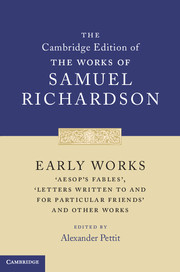Book contents
- Frontmatter
- Dedication
- Contents
- General Editors’ Preface
- Acknowledgements
- Chronology
- List of Abbreviations
- General Introduction
- Textual Introduction
- The Apprentice’s Vade Mecum (1733)
- A Seasonable Examination of the Pleas and Pretensions (1735)
- Preface to Aubin, A Collection of Entertaining Histories and Novels (1739)
- Aesop’s Fables (1739)
- Letters Written to and for Particular Friends (1741)
- Six Original Letters Upon Duelling (1765)
- Appendix: The Infidel Convicted (1731)
- Postscript
- Emendations
- Word-division
- Bibliographical Descriptions of Early Editions
- Explanatory Notes
- Index
Letter LXVI
Published online by Cambridge University Press: 30 June 2022
- Frontmatter
- Dedication
- Contents
- General Editors’ Preface
- Acknowledgements
- Chronology
- List of Abbreviations
- General Introduction
- Textual Introduction
- The Apprentice’s Vade Mecum (1733)
- A Seasonable Examination of the Pleas and Pretensions (1735)
- Preface to Aubin, A Collection of Entertaining Histories and Novels (1739)
- Aesop’s Fables (1739)
- Letters Written to and for Particular Friends (1741)
- Six Original Letters Upon Duelling (1765)
- Appendix: The Infidel Convicted (1731)
- Postscript
- Emendations
- Word-division
- Bibliographical Descriptions of Early Editions
- Explanatory Notes
- Index
Summary
From a Daughter to her Father, pleading for her Sister, who had married without his Consent.
Honoured Sir,
The kind Indulgence you have always shewn to your Children, makes me presume to become an Advocate for my Sister, tho’ not for her Fault. She is very sensible of that, and sorry she has offended you; but has great hopes, that Mr. Robinson will prove such a careful and loving Husband to her, as may atone for his past Wildness, and engage your Forgiveness. For all your Children are sensible of your paternal Kindness, and that you wish their Good more for their sakes, than your own.
This makes it the more wicked to offend so good a Father: But, dear Sir, be pleased to consider, that it now cannot be helped, and that she may be made by your Displeasure very miserable in her own Choice; and as his Faults are owing to the Inconsideration of Youth, or otherwise it would not have been a very discreditable Match, had it had your Approbation; I could humbly hope, for my poor Sister's sake, that you will be pleased rather to encourage his present good Resolutions, by your kind Favour, than make him despair of a Reconciliation, and so perhaps treat her with a Negligence, which hitherto she is not apprehensive of. For he is really very fond of her, and I hope will continue so. Yet is she dejected for her Fault to you, and wishes, yet dreads, to have your Leave to throw herself at your Feet, to beg your Forgiveness and Blessing, which would make the poor dear Offender quite happy.
Pardon, Sir, my interposing in her Favour, in which my Husband also joins. She is my Sister. She is your Daughter; tho’ she has not done so worthily as I wish, to become that Character. Be pleased, Sir, to forgive her, however; and also forgive me, pleading for her.Who am,
Your ever-dutiful Daughter.
- Type
- Chapter
- Information
- Early Works'Aesop's Fables', 'Letters Written to and for Particular Friends' and Other Works, pp. 399 - 400Publisher: Cambridge University PressPrint publication year: 2011

